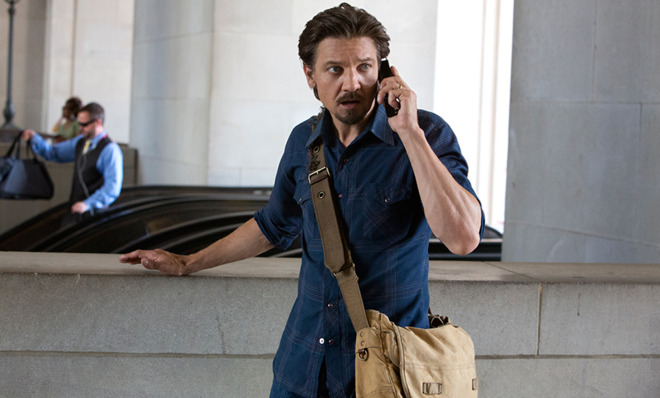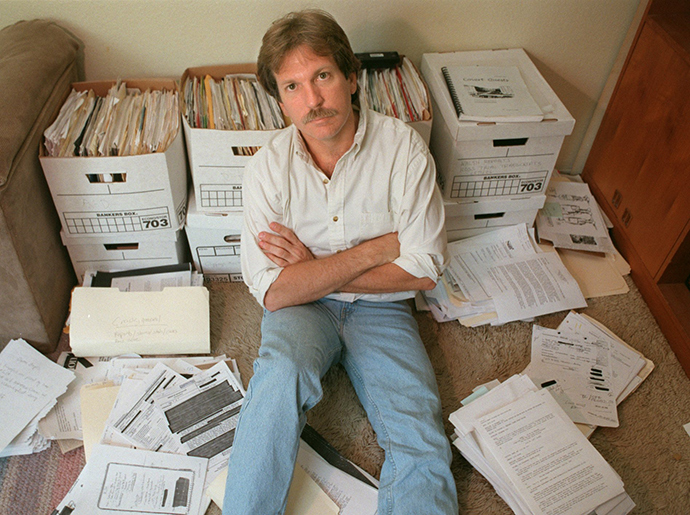Kill the Messenger: A bracing new biopic exposes the media's corrupt core
The story of Gary Webb proves that the strictest standards apply only to journalists who criticize the CIA


A free daily email with the biggest news stories of the day – and the best features from TheWeek.com
You are now subscribed
Your newsletter sign-up was successful
Kill the Messenger is a biopic about Gary Webb, a Pulitzer Prize–winning reporter who had the gall to report on the CIA's involvement with cocaine trafficking in the 1980s. He was hazed out of his profession for it. It's a timely movie that not only rehabilitates a slandered journalist but serves as a continuing indictment of a mainstream press that is far too deferential to power.
Back in the '80s, one of Ronald Reagan's key foreign policy objectives was toppling the leftist government of Nicaragua, which won fair elections in 1984. The tool in this effort was the Contras, a bunch of right-wing goons armed and trained by the CIA.
The Contras were totally dependent on CIA support, which included various illegal schemes to divert money their way. The most famous was the illegal sale of arms to Iran in violation of an embargo, which became the Iran-Contra Affair. Another, according to Webb's 1996 "Dark Alliance" story in the San Jose Mercury News, involved the CIA looking the other way as Contra-allied traffickers ran dizzying amounts of cocaine into the United States, which was then cooked up into crack by U.S. dealers, most notably Los Angeles' "Freeway" Ricky Ross.
The Week
Escape your echo chamber. Get the facts behind the news, plus analysis from multiple perspectives.

Sign up for The Week's Free Newsletters
From our morning news briefing to a weekly Good News Newsletter, get the best of The Week delivered directly to your inbox.
From our morning news briefing to a weekly Good News Newsletter, get the best of The Week delivered directly to your inbox.
In response, the mainstream media — especially The New York Times, The Washington Post, and the Los Angeles Times — conducted a prolonged campaign of character assassination and nitpicking that basically ended Webb's career.

Ryan Grim of The Huffington Post goes over the story, the ensuing media controversy, and the historical context in great detail here. The upshot is that while Webb might have made some false, hyperbolic claims (the most egregious being that Contra-allied traffickers established the "first pipeline" between the cartels and black communities) the core of the story was basically correct.
The CIA knew about the trafficking and did nothing, because it was supporting United States foreign policy. The Contras were so deeply intertwined with the CIA — to the point that some drug flights used the same airfields and planes as CIA weapons shipments — that it beggars belief to imagine that the CIA didn't know all about it.
In fact, the nitpicks were far more misleading than Webb's story. His critics gave straw-man characterizations of Webb's argument, and left readers with the overwhelming impression that the CIA was not involved in drug smuggling at all. The L.A. Times went so far as to wonder at length about whether black people are more prone to believing in conspiracy theories.
A free daily email with the biggest news stories of the day – and the best features from TheWeek.com
The hounding of Webb in the mainstream media continues to this day. The Post's assistant managing editor of investigations, Jeff Leen, claims that Webb was no journalistic hero, sniffing, "Extraordinary claims require extraordinary evidence."
The mythos of places like the Post is that they're paragons of upright, responsible reporting. But it turns out that those standards are more rigorously applied to those who dare criticize the powerful. There was no "extraordinary evidence" backing up Judith Miller as she copy-pasted the Bush administration's false WMD claims into the front page of The New York Times. The Post was not much better when it came to parroting the administration's line and muffling dissenting voices. And the Post isn't one to talk about ethics, since it apparently has no problem employing a known plagiarist.
Anyway, there was a great deal of evidence behind the CIA-cocaine story. In fact, Webb's piece wasn't even the first time the story had been reported — it was just the first time the major press had been forced to pay serious attention to it, instead of burying it in the back pages. A Senate investigation led by then-Sen. John Kerry confirmed the basic facts of the case back in 1989.
But the grandees of American journalism weren't as interested in publishing that story as they were in running interference for a brutal, worthless agency whose illegal war had utterly failed in all its goals.
It's true that if a reporter has a Webb-esque scoop implicating high levels of the American establishment, it is a good idea to have an absolutely ironclad case with no mistakes or exaggerated claims. Not because American journalism is particularly concerned with the truth, but because the CIA lickspittles who continue to hold important posts throughout the media will come at you with everything they've got.
Ryan Cooper is a national correspondent at TheWeek.com. His work has appeared in the Washington Monthly, The New Republic, and the Washington Post.
-
 Crisis in Cuba: a ‘golden opportunity’ for Washington?
Crisis in Cuba: a ‘golden opportunity’ for Washington?Talking Point The Trump administration is applying the pressure, and with Latin America swinging to the right, Havana is becoming more ‘politically isolated’
-
 5 thoroughly redacted cartoons about Pam Bondi protecting predators
5 thoroughly redacted cartoons about Pam Bondi protecting predatorsCartoons Artists take on the real victim, types of protection, and more
-
 Palestine Action and the trouble with defining terrorism
Palestine Action and the trouble with defining terrorismIn the Spotlight The issues with proscribing the group ‘became apparent as soon as the police began putting it into practice’
-
 The billionaires’ wealth tax: a catastrophe for California?
The billionaires’ wealth tax: a catastrophe for California?Talking Point Peter Thiel and Larry Page preparing to change state residency
-
 Bari Weiss’ ‘60 Minutes’ scandal is about more than one report
Bari Weiss’ ‘60 Minutes’ scandal is about more than one reportIN THE SPOTLIGHT By blocking an approved segment on a controversial prison holding US deportees in El Salvador, the editor-in-chief of CBS News has become the main story
-
 Has Zohran Mamdani shown the Democrats how to win again?
Has Zohran Mamdani shown the Democrats how to win again?Today’s Big Question New York City mayoral election touted as victory for left-wing populists but moderate centrist wins elsewhere present more complex path for Democratic Party
-
 Millions turn out for anti-Trump ‘No Kings’ rallies
Millions turn out for anti-Trump ‘No Kings’ ralliesSpeed Read An estimated 7 million people participated, 2 million more than at the first ‘No Kings’ protest in June
-
 Ghislaine Maxwell: angling for a Trump pardon
Ghislaine Maxwell: angling for a Trump pardonTalking Point Convicted sex trafficker's testimony could shed new light on president's links to Jeffrey Epstein
-
 The last words and final moments of 40 presidents
The last words and final moments of 40 presidentsThe Explainer Some are eloquent quotes worthy of the holders of the highest office in the nation, and others... aren't
-
 The JFK files: the truth at last?
The JFK files: the truth at last?In The Spotlight More than 64,000 previously classified documents relating the 1963 assassination of John F. Kennedy have been released by the Trump administration
-
 'Seriously, not literally': how should the world take Donald Trump?
'Seriously, not literally': how should the world take Donald Trump?Today's big question White House rhetoric and reality look likely to become increasingly blurred
